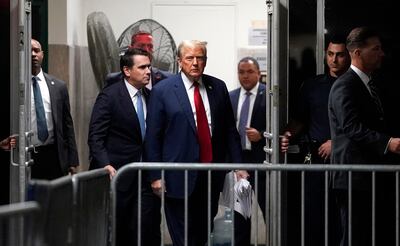In a huge change from his strategy in 2020, US President Joe Biden is running to hold the political centre and even attempt to pick off disaffected parts of the political right.
He is seeking a strikingly different winning coalition than four years ago. Then, as now, he presented himself as the "normal" and "sane" candidate running against an opponent he depicted as distinctly outside of the normative spectrum of all American political traditions and as of questionable emotional stability. He may find it easier to depict former president Donald Trump as eccentric and, in his own words, a would be dictator, if only, as he vowed, "on the first day.”
In 2020, Mr Biden ran on uniting the Democratic Party, working hard to court the progressive left. This time he’s casting himself as preventing the Democratic Party from falling into the grip of the far left, which may have overplayed its hand with much of the US electorate.
He isn’t repudiating the left, but appears to be essentially telling them to take it or leave it, relying on a dramatic contrast with Mr Trump. That’s likely to become clearer and starker as the campaign progresses.

Mr Trump and his backers are proposing a range of extraordinarily radical new policies, including the unprecedented mass deportation of millions of undocumented immigrants and asylum-seekers.
Right-wing think tanks are planning radical policy shifts, including a thoroughgoing purge of the federal administrative workforce, replacing tens of thousands of civil servants with handpicked ideological replacements.
The purpose would not merely be to seize control of the apparatus of government into the indefinite future, but more immediately to conduct a vast rollback of regulatory administration by the federal government that has insured compliance with environmental, health and safety, diversity and inclusion, and other public interest standards developed over the past half century.
Mr Trump has reportedly been courting millions in de facto campaign contributions from super wealthy donors, promising additional tax cuts and de-regulation. He has even been asking donors to specify precisely what regulations they find most irksome to their business interests, linking major donations to specific attempted administrative rollbacks.
Mr Trump will counter attack against a left-wing cultural agenda that has alienated many ordinary white Americans, though Mr Biden will cast himself as an effective force of attenuation and containment. Even more important will be the Republican emphasis on immigration and the economic, ethnic and racial anxieties it often represents.
Mr Biden will counter that, to the chagrin of many progressives, under his leadership Democrats in Congress voted for immigration legislation that amounted to a Republican wish list but that was rejected, at Mr Trump's insistence, by House Republicans who refused to take yes for an answer. The legislation contained no aspect of the liberal immigration agenda.
Mr Biden will certainly argue that Mr Trump cherishes the crisis at the southern border as a political issue, but wants nothing to do with a solution.
And Mr Biden has been handed a tremendously powerful issue by the US Supreme Court. The wholesale attack on reproductive freedom, in vitro fertilisation and even contraception in Republican-dominated states, even extending to efforts to limit free speech and the freedom of movement within the country, could prove to be Mr Biden's most powerful issue.
Realising this, Mr Trump has moderated his own stance on the matter and now backs a nationwide 15-week standard, after which states would be free to impose strict and even total restrictions. But Mr Biden is far closer to the national mood, which opposes the Republican commitment to draconian limitations.
The issue of reproductive rights has not proved a short-lived source of backlash. To the contrary, in every election in which it has been a major feature, even in the most right-wing constituencies, anti-abortion candidates have lost to those favouring protecting reproductive rights.
Mr Biden will be hoping for a massive turnout by Americans, especially women, appalled at the once-Trump-inspired turn towards totalising restrictions and the drive among many Republicans for a national ban on all pregnancy terminations, often with no restrictions for rape and incest, even among children.
Unlike in the past where a Democratic push for greater reproductive freedom was essentially a liberal or even left-wing agenda, in this case Mr Biden will be appealing to the broad centre he is targeting.
Should Mr Trump be convicted, as seems entirely plausible, of a major felony in the adult film star hush money case, Mr Biden would have further opportunities to make inroads beyond the centre and into the political right. He could at least persuade Republicans who cannot countenance voting for a convicted felon to stay home if not hold their noses and vote for the Democrat.
Mr Biden may feel that much of the progressive left simply cannot be won over on the merits. His strong support for Israel's war of vengeance in Gaza, only recently involving clear limitations and sharp, albeit limited, criticism, is an obvious example. Nonetheless, the President can point to an impressive record of liberal legislative and executive order domestic accomplishments.
Americans will ultimately have to choose between two candidates representing very different visions. Mr Biden will be running as the embodiment of the Constitution and traditional political order, whereas Mr Trump has displayed an open hostility to national norms and traditions, particularly with his vow to be a dictator, albeit only, he says, for the first day. But many Americans will realise that this authoritarian first day can extend itself indefinitely if the goals it is supposed to accomplish are not secured in 24 hours, as seems virtually inevitable.
So the President is gambling that many otherwise alienated progressives will, eventually, feel impelled to support him no matter how reluctantly, and that he has a real shot of not only holding the political centre but also convincing many disenchanted Republicans to break ranks for once in order to preserve the constitutional order, or at least stay home rather than voting for a convicted felon.
That's a very different course of action from 2020. Given the increasingly radical politics and unstable personality of his opponent, it may yet prove to be a wise gamble.


